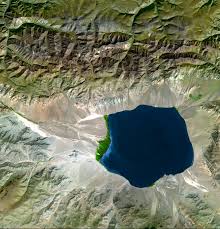记忆方法
记忆“basin”可以将其与“base”联想,想象一个广口容器的基础部分,“base”就是底座,而“basin”是一个较大的开口容器,其形状类似其基础(底座)。通过这种类比,你可以记住“basin”的意思是一个 basin 是一个有边的底座或者盆。
以上内容由AI生成, 仅供参考和借鉴
中文词源
basin 盆地
来自拉丁词bacca, 酒杯,容器,形容盆地如装水容器。来自词根fasc, 编织,捆,词源同basket, fascism.
英语词源
- basin
-
basin: [13] Basin comes via Old French bacin from medieval Latin *bacchinus, a derivative of Vulgar Latin *bacca ‘water vessel’, which may originally have been borrowed from Gaulish. The Old French diminutive bacinet produced English basinet ‘helmet’ [14] and, with a modification of the spelling, bassinette ‘cradle’ [19], which was originally applied in French to any vaguely basin-shaped object.
=> basinet, bassinette - basin (n.)
- "large shallow vessel or dish," c. 1200, from Old French bacin (11c., Modern French bassin), from Vulgar Latin *baccinum, from *bacca "water vessel," perhaps originally Gaulish. Meaning "large-scale artificial water-holding landscape feature" is from 1712. Geological sense of "tract of country drained by one river or draining into one sea" is from 1830.
权威例句
- 1. When he had finished washing he began to wipe the basin clean.
- 他清洗完后开始把洗脸池擦拭干净。
- 2. Place the eggs and sugar in a large basin.
- 把鸡蛋和糖放在一个大碗里。
- 3. The basin favours the development of farming and animal husbandry.
- 这个盆地有利于农业和畜牧业的发展.
- 4. The water was even with the rim of the basin.
- 盆里的水与盆边平齐了.
- 5. She tipped the flour into the basin.
- 她把面粉倒进盆里.

